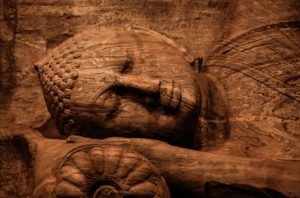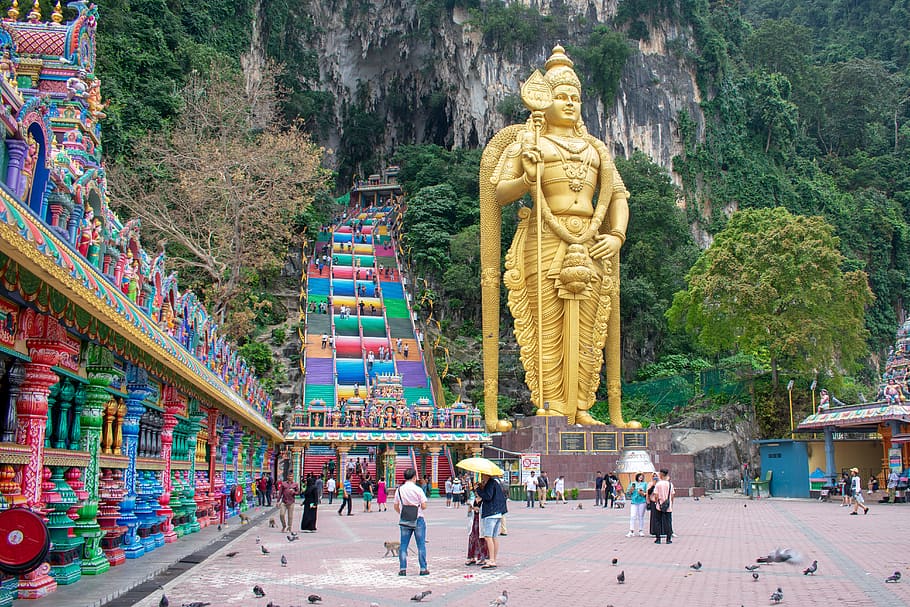If you’re practicing either Buddhism or Hinduism, you cannot deny that there are links that connect the two faiths. My mother told me that a lot of Hinduism’s teachings do play a part in Buddhism. My grandmother had told me the same thing and she became a Buddhist nun a few years ago. This is coming from a predominantly Buddhist family that emigrated from Vietnam.
There are many things that can link both Buddhism and Hinduism together. Siddhartha Gautama, the prince who became the Buddha was born a Hindu. The tribe was also Hindu. In a sense, they are linked by blood. Since both faiths originated in India, they are linked by the same soil. One can relate this to the “law of the blood, law of the soil” in terms of a dual-citizenship.
 By blood, by soil, and by fate, both faiths seemed to be interlinked to each other in a whole lot of different ways. The Sanskrit terms found in Buddhism can also be found in Hinduism as a counterpart. The language from Hinduism was very much adopted and applied to the teachings of Buddhism. Everything is based on how you behave instead of what caste and heritage you’re apart of. Both of them focus on your needs and your misdeeds.
By blood, by soil, and by fate, both faiths seemed to be interlinked to each other in a whole lot of different ways. The Sanskrit terms found in Buddhism can also be found in Hinduism as a counterpart. The language from Hinduism was very much adopted and applied to the teachings of Buddhism. Everything is based on how you behave instead of what caste and heritage you’re apart of. Both of them focus on your needs and your misdeeds.
Both faiths observe and practice the concept of “ahimsa” which is non-violence, which is why you don’t see any violence or barely any radicalism in either faith. In the United States, you hardly see any Buddhists, Hindus, Sikhs, or Jainists become politically active. I don’t know that many Buddhist’s asides from myself that are politically and socially active. My mother told me that Buddhists and Hindus want to be left alone. But I learned that in the near future we may not be left alone as religious fundamentalists might attack us next.
During his protests against British occupation, Gandhi felt ashamed that protestors used violence. Instead, he applied the concept of ahimsa and did a hunger strike instead. That made a huge impact that gained Gandhi many followers.
The ancient king was known as Ashoka also adopted the concept of ahimsa after his conquest throughout India. He had felt ashamed of the death, destruction, and bloodshed that was caused in the conquering of India. Both faiths have respect for all life and to avoid intentional killing.
Hinduism is a polytheistic faith with numerous gods and goddesses
While Buddhism is a nontheistic faith, it considers all beings of divine power to be “enlightened ones”. One can consider Jesus Christ enlightened. Hinduism is a polytheistic faith with numerous gods and goddesses. However, they could still be given the title of Buddha. Brahma could be considered the “Buddha of wisdom” in Buddhism and worshipped as a god in Hinduism. Both faiths have the use of images.
Both faiths hold firm to the belief of karma which is the accumulation of your good deeds and your bad deeds. It goes hand and hand with the cycle of reincarnation. You live, you die, you’re reborn, and you die again. To escape that circle, you must have good karma. Karma is a very important link between both Hinduism and Buddhism. Karma is basically the cause and effect. It’s not about rewards or punishment. But good karma rewards you while bad karma punishes you.
Both faiths have the swastika symbol to keep evil away. However, the swastika symbol in Hinduism and Buddhism is different from that in Nazism. Nazism distorts the swastika symbol.
Yoga also plays an important part in both faiths as it’s about strength and discipline.
These are the major thinks that link both Hinduism and Buddhism. One could say that Buddhism is an off-shoot of Hinduism. At the same time, Buddhism is something special and unique in its own right just as Hinduism is.
As there are links between Hinduism and Buddhism, the same can go between Hinduism and Shinto, or Hinduism and the Chinese religions.





